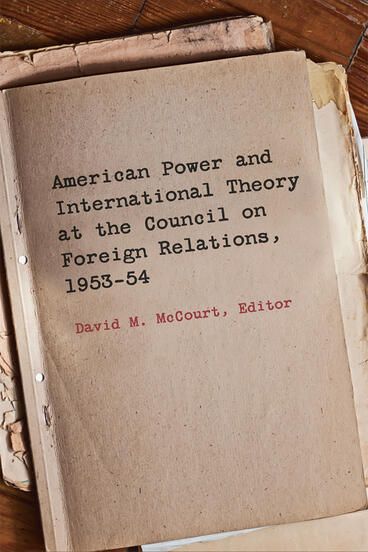American Power and International Theory at the Council on Foreign Relations, 1953-54
The seeds of the theory-practice nexus in Cold War U.S. foreign policy
Description
Between December 1953 and June 1954, the elite think-tank the Council on Foreign Relations (CFR) joined prominent figures in International Relations, including Pennsylvania’s Robert Strausz-Hupé, Yale’s Arnold Wolfers, the Rockefeller Foundation’s William Thompson, government adviser Dorothy Fosdick, and nuclear strategist William Kaufmann. They spent seven meetings assessing approaches to world politics—from the “realist” theory of Hans Morgenthau to theories of imperialism of Karl Marx and V.I. Lenin—to discern basic elements of a theory of international relations.
The study group’s materials are an indispensable window to the development of IR theory, illuminating the seeds of the theory-practice nexus in Cold War U.S. foreign policy. Historians of International Relations recently revised the standard narrative of the field’s origins, showing that IR witnessed a sharp turn to theoretical consideration of international politics beginning around 1950, and remained preoccupied with theory. Taking place in 1953–54, the CFR study group represents a vital snapshot of this shift.
This book situates the CFR study group in its historical and historiographical contexts, and offers a biographical analysis of the participants. It includes seven preparatory papers on diverse theoretical approaches, penned by former Berkeley political scientist George A. Lipsky, followed by the digest of discussions from the study group meetings. American Power and International Theory at the Council on Foreign Relations, 1953–54 offers new insights into the early development of IR as well as the thinking of prominent elites in the early years of the Cold War.
David M. McCourt is Assistant Professor of Sociology at the University of California, Davis.
Reviews
“This book is an important contribution to scholarship on the disciplinary history of International Relations and of the postwar human sciences. Essential reading.”
—Duncan Bell, University of Cambridge
“An excellent source of primary material for students of IR, the history of social science development, links between knowledge and power, and the role of elite think tanks and their networks. It also documents a core ambiguity if not contradiction in understandings of what IR should be and what it should be for between those concerned with decision making and policy and those who viewed scholarship as one step removed from power itself.”
—Inderjeet Parmar, City, University of London

